NCERT Solutions for Class 10 English Chapter 1 - Nelson Mandela - Long Walk to Freedom
Oral Comprehension Check - Page 18
Q1. Where did the ceremonies take place? Can you name any public buildings in India that are made of sandstone?
Ans: The ceremonies took place in the lovely sandstone amphitheatre formed by the Union Buildings in Pretoria, which were attended by dignitaries and world leaders of several nations. In India, the Rashtrapati Bhavan and Red Fort are two public buildings that are made of red sandstone.
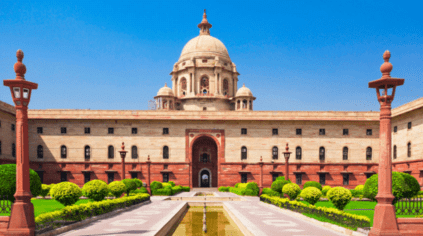 Rashtrapati BhavanQ2. Can you say how 10 May is an ‘autumn day’ in South Africa?
Rashtrapati BhavanQ2. Can you say how 10 May is an ‘autumn day’ in South Africa?
Ans: South Africa lies in the Southern Hemisphere. Hence, in Southern Africa the autumn season falls in May. 10 May was the day of South Africa's largest gathering, with many international leaders in attendance to witness the installation of the country's first non-racial democratic government.
Oral Comprehension Check - Page 19
Q3. At the beginning of his speech, Mandela mentions “an extraordinary human disaster”. What does he mean by this? What is the “glorious … human achievement” he speaks of at the end?
Ans: In Mandela’s speech ‘an extraordinary human disaster’, he wanted to express his strong feelings against the practice of Apartheid in South Africa. Under Apartheid, there was racial segregation of people based on colour, and the blacks suffered the most as they were discriminated against by the rest. They could not enjoy the right to freedom. Mandela was jailed for 18 years on the infamous ‘Robben Island’ where he was mistreated by the authorities. He considered it a “great glorious human achievement” that he became the first Black President of South Africa, where the blacks were deprived of basic needs and suffered different kinds of discrimination, and were treated badly.
Q4. What does Mandela thank the international leaders for?
Ans: Mandela felt extremely privileged to welcome the dignitaries and international leaders at the swearing-in ceremony because it was not too long ago when the South Africans were considered outlaws. He therefore, thanked all of them for having come from far and wide to witness the historical oath-taking ceremony of the first Black President of South Africa. This was a wonderful gesture of international recognition to a newly born free democratic nation. This event could be considered as a common victory for justice, peace and human dignity.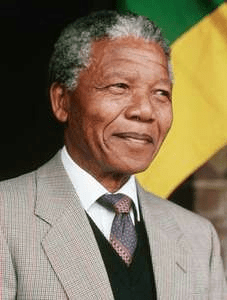 Nelson Mandela
Nelson Mandela
Q5. What ideals does he set out for the future of South Africa?
Ans:Mandela set the ideals of liberating the people of South Africa from the continuing bondage of poverty, deprivation, suffering, gender and other discrimination. He wanted the people of the country to enjoy the right to freedom from all forms of bondage and prejudice
Oral Comprehension Check - Page 21
1. What do the military generals do? How has their attitude changed, and why?
Ans: The highest military generals of South African defence force saluted Mandela and pledged their loyalty which was of great significance as during apartheid era they would have arrested him. The change in their attitude was because of struggle and sacrifices put in by many heroes of South Africa. This struggle not only ensured the freedom of a nation struggling with apartheid, bur brought a change in mindsets of many. He believed that love can also be taught and human being is naturally inclined towards love rather than hate.
Q2. Why were two national anthems sung?
Ans: On the auspicious occasion of the inauguration ceremony, two national anthems were sung. ‘Nkosi Sikelel iAfrika’, which was once the anthem of the black people who suffered under apartheid, and ‘Die Stem’, which was the anthem of the old Republic and was associated with the white community. Singing both anthems symbolized the unity and equality of all South Africans, regardless of race.
Q3. How does Mandela describe the systems of government in his country
(i) in the first decade, and
(ii) in the final decade, of the twentieth century?
Ans:
(i) In the first decade of the twentieth century, the white-skinned people of South Africa patched up their differences and erected a system of racial domination against the dark-skinned people of their own land, thus creating the basis of one of the harshest and most inhumane societies the world had ever known.
(ii) In the final decade of the twentieth century, the previous system had been overturned forever and replaced by one that recognized the rights and freedoms of all peoples, regardless of the colour of their skin.
Q4. What does courage mean to Mandela?
Ans: For Mandela courage does not mean the absence of fear but a victory over fear. According to him brave men need not be fearless but should be able to conquer fear.
Q5. Which does he think is natural, to love or to hate?
Ans: Mandela thought that love comes more naturally to the human heart rather than hate.
Oral Comprehension Check - Page 24
1. What “twin obligations” does Mandela mention?Ans: Mandela mentions that every man has twin obligations. The first is to his family, parents, wife and children; the second obligation is to his people, his community and his country.
Q2. What did being free mean to Mandela as a boy, and as a student? How does he contrast these “transitory freedoms” with “the basic and honourable freedoms”?
Ans: Like any other kid for Mandela also freedom meant the freedom to make merry and enjoy a blissful life. Once anybody becomes an adult, the antics of childhood looks transitory because most of the childish activity is wasteful from an adult’s perspective. Once you are an adult then someday you have to earn a livelihood to bring the bacon home, then only you get an honorable existence in the family and in the society.
Q3. Does Mandela think the oppressor is free? Why/Why not?
Ans: Mandela does not feel that the oppressor is free because according to him an oppressor is a prisoner of hatred, who is locked behind the bars of prejudice and narrow-mindedness. He feels that both the oppressor and the oppressed are robbed of their humanity.
Thinking about the Text (Page 24)
Q1. Why did such a large number of international leaders attend the inauguration? What did it signify the triumph of?
Ans: To be the part of the inauguration, international leaders showed a gesture of solidarity from international community to the idea of end of apartheid. It was the significance of the victory of good over evil and triumph of a tolerant society without any discrimination.
Q2. What does Mandela mean when he says he is “simply the sum of all those African patriots” who had gone before him?
Ans: By saying that he is “simply the sum of all those African patriots”, Mandela offers his tribute to all the people who had sacrificed their lives in favour of the struggle for freedom. He says that he shall always remain grateful and thankful to those who had gone before him because those freedom fighters had paved the path of cooperation and unity for him. Therefore, Mandela felt that when he came to power, he would bring equality among his people with their support and cooperation.
Q3. Would you agree that the “depths of oppression” create “heights of character? How does Mandela illustrate this? Can you add your own examples to this argument?
Ans: Yes, I agree with the statement that “depths of oppression” do create ‘heights of character”. Nelson Mandela illustrates this by citing examples of great heroes of South Africa such as Oliver Tambo, Walter Sisulu, Chief Luthulis, Yusuf Dadoos, Bram Fischers, and Robert Sobukwes, among others who inspired others by sacrificing their lives in the long struggle for freedom.
In India’s pre-Independence era, there was a galaxy of great leaders who didn’t bend their knees to the oppression of British rule, such as Netaji Subhash Chandra Bose, Mahatma Gandhi, Sardar Vallabhbhai Patel, Lala Lajpat Rai, Chandra Shekhar Ajad, Bhagat Singh and many more. Nelson Mandela seems to be absolutely right, if we compare them with the quality of political leaders that came later. It seems that great leaders are created in the crucible of oppression and suffering.
Q4. How did Mandela’s understanding of freedom change with age and experience?
Ans: With age and experience, Mandela understood the real meaning of freedom. As a young boy, he thought that he was born free and believed that as long as he obeyed his father and abided by the customs of his tribe, he was free in every possible manner. As he grew older, freedom to raise a family and freedom to earn livelihood started dominating his thoughts. Gradually he realised that he was selfish during his boyhood. He slowly understood that it was not just his freedom that was being curtailed, but the freedom of all blacks. It was the freedom from fear and prejudice. Age and experience widened his perspective of freedom.
Q5. How did Mandela’s ‘hunger for freedom’ change his life?
Ans: During his youth, Mandela realised that it was not just his freedom alone that was being curtailed, but the freedom of all Black people. The hunger for his own freedom became the hunger for freedom for all his fellow brothers and sisters. In the process, this changed the fearful man into a bold rebel. Mandela sacrificed the comforts of a settled family life to fight for the freedom of his countrymen. He joined the African National Congress, and this transformed him from a frightened young man into a fearless person who fought against racial prejudice and colour discrimination.
Thinking about Language
I. There are nouns in the text (formation, government) which are formed from the corresponding verbs (form, govern) by suffixing − (at)ion or ment. There may be a change in the spelling of some verb−noun pairs: such as rebel, rebellion; constitute, constitution.
Q1. Make a list of such pairs of nouns and verbs in the text.
Ans: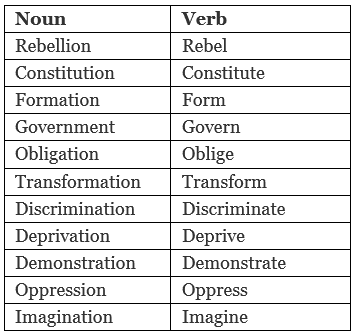
Q2. Read the paragraph below. Fill in the blanks with the noun forms of the verbs in brackets.
Martin Luther King’s __________ (contribute) to our history as an outstanding leader began when he came to the __________ (assist) of Rosa Parks, a seamstress who refused to give up her seat on a bus to a white passenger. In those days American Blacks were confined to positions of second class citizenship by restrictive laws and customs. To break these laws would mean __________ (subjugate) and __________ (humiliate) by the police and the legal system. Beatings, __________ (imprison) and sometimes death awaited those who defied the System. Martin Lither King’s tactics of protest involved non-violent __________ (resist) to racial injustice.
Ans: Martin Luther King’s contribution (contribute) to our history as an outstanding leader began when he came to the assistance(assist) of Rosa Parks, a seamstress who refused to give up her seat on a bus to a white passenger. In those days American Blacks were confined to positions of second class citizenship by restrictive laws and customs. To break these laws would mean subjugation (subjugate) and humiliation (humiliate) by the police and the legal system. Beatings, imprisonment (imprison) and sometimes death awaited those who defied the System. Martin Luther King’s tactics of protest involved non-violent resistance (resist) to racial injustice.
Page No. 25
II. Here are some more examples of ‘the’ used with proper names. Try to say what these sentences mean. (You may consult a dictionary if you wish. Look at the entry for ‘the’)
1. Mr Singh regularly invites the Amitabh Bachchans and the Shah Rukh Khans to his parties.
2. Many people think that Madhuri Dixit is the Madhubala of our times.
3. History is not only the story of the Alexanders, the Napoleons and the Hitlers, but of ordinary people as well.
Ans:
1. This means that Mr Singh regularly invites famous personalities such as Amitabh Bachchan and Shah Rukh Khan to his parties.
2. This means that Madhuri Dixit is compared to a landmark in acting in the form of legendary actress Madhubala.
3. This means that history is not only the story of the great fighters and leaders such as Alexander, Napoleon and Hitler, but also of ordinary people.
Page No. 26
III. Match, the italicised phrases in Column A with the phrase nearest meaning in Column B. (Hint: First look for the sentence in the text in which the phrase in column A occurs.)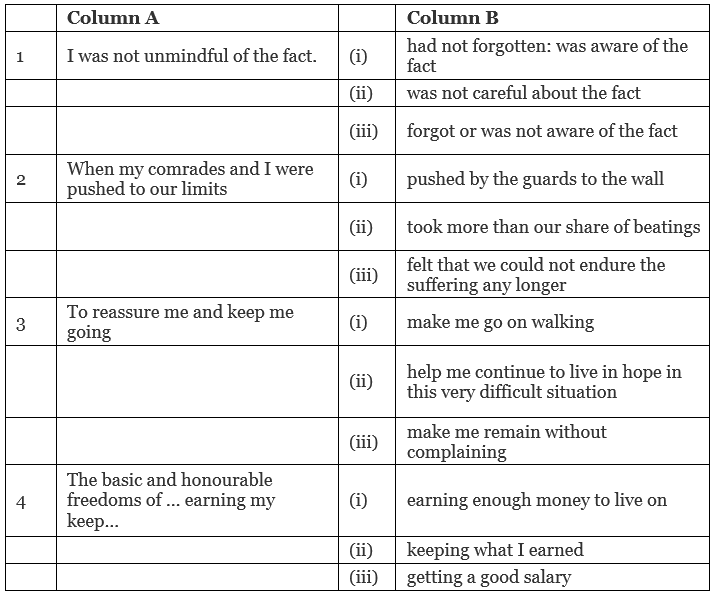
Ans:
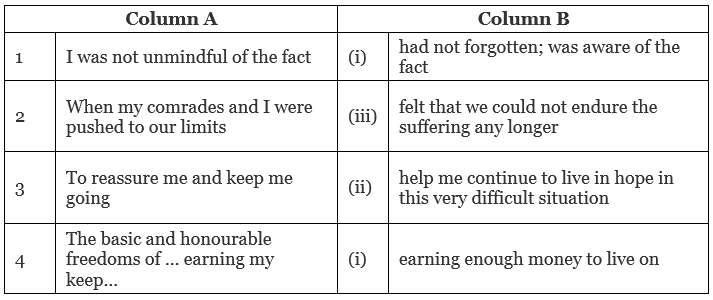
|
61 videos|616 docs|69 tests
|
FAQs on NCERT Solutions for Class 10 English Chapter 1 - Nelson Mandela - Long Walk to Freedom
| 1. What are the main themes explored in Nelson Mandela's "Long Walk to Freedom"? |  |
| 2. How does Nelson Mandela describe his early life and its influence on his later actions? |  |
| 3. What role did Nelson Mandela play in the anti-apartheid movement? |  |
| 4. What are some significant events mentioned in "Long Walk to Freedom" that marked Nelson Mandela's journey? |  |
| 5. How does Nelson Mandela’s narrative in "Long Walk to Freedom" inspire readers today? |  |






















